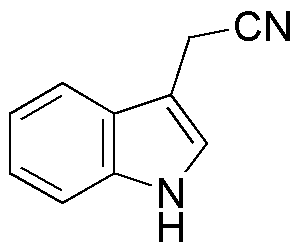3-Indoleacetonitrile is widely utilized in research focused on:
- Plant Growth Regulation: This compound acts as a plant hormone analog, promoting growth and development. It's particularly useful in agricultural research for enhancing crop yields.
- Synthesis of Pharmaceuticals: It serves as an important intermediate in the synthesis of various pharmaceutical compounds, especially in the development of anti-cancer agents.
- Biochemical Studies: Researchers use it to study indole derivatives' effects on biological systems, aiding in the understanding of metabolic pathways and enzyme interactions.
- Material Science: The compound is explored for its potential in developing novel materials, including polymers and nanomaterials, due to its unique chemical properties.
- Environmental Applications: It is investigated for its role in bioremediation processes, helping to break down pollutants in soil and water, thus contributing to environmental sustainability.
Informations générales
Propriétés
Sécurité et réglementation
Applications
3-Indoleacetonitrile is widely utilized in research focused on:
- Plant Growth Regulation: This compound acts as a plant hormone analog, promoting growth and development. It's particularly useful in agricultural research for enhancing crop yields.
- Synthesis of Pharmaceuticals: It serves as an important intermediate in the synthesis of various pharmaceutical compounds, especially in the development of anti-cancer agents.
- Biochemical Studies: Researchers use it to study indole derivatives' effects on biological systems, aiding in the understanding of metabolic pathways and enzyme interactions.
- Material Science: The compound is explored for its potential in developing novel materials, including polymers and nanomaterials, due to its unique chemical properties.
- Environmental Applications: It is investigated for its role in bioremediation processes, helping to break down pollutants in soil and water, thus contributing to environmental sustainability.
Documents
Fiches de données de sécurité (FDS)
La FDS fournit des informations de sécurité complètes sur la manipulation, le stockage et l’élimination du produit.
Spécifications du produit (PS)
Le PS fournit une description complète des propriétés du produit, notamment sa composition chimique, son état physique, sa pureté et les exigences de stockage. Il détaille également les plages de qualité acceptables et les applications prévues du produit.
Certificats d'analyse (COA)
Recherchez des certificats d'analyse (COA) en saisissant le numéro de lot du produit. Les numéros de lot et de lot se trouvent sur l'étiquette d'un produit, après les mots « Lot » ou « Lot de fabrication ».
Numéro de catalogue
Numéro de lot/série
Certificats d'origine (COO)
Ce certificat d'exploitation confirme le pays dans lequel le produit a été fabriqué, et détaille également les matériaux et composants utilisés et s'il est issu de sources naturelles, synthétiques ou autres sources spécifiques. Ce certificat peut être requis pour les douanes, le commerce et la conformité réglementaire.
Numéro de catalogue
Numéro de lot/série
Fiches de données de sécurité (FDS)
La FDS fournit des informations de sécurité complètes sur la manipulation, le stockage et l’élimination du produit.
DownloadSpécifications du produit (PS)
Le PS fournit une description complète des propriétés du produit, notamment sa composition chimique, son état physique, sa pureté et les exigences de stockage. Il détaille également les plages de qualité acceptables et les applications prévues du produit.
DownloadCertificats d'analyse (COA)
Recherchez des certificats d'analyse (COA) en saisissant le numéro de lot du produit. Les numéros de lot et de lot se trouvent sur l'étiquette d'un produit, après les mots « Lot » ou « Lot de fabrication ».
Numéro de catalogue
Numéro de lot/série
Certificats d'origine (COO)
Ce certificat d'exploitation confirme le pays dans lequel le produit a été fabriqué, et détaille également les matériaux et composants utilisés et s'il est issu de sources naturelles, synthétiques ou autres sources spécifiques. Ce certificat peut être requis pour les douanes, le commerce et la conformité réglementaire.


